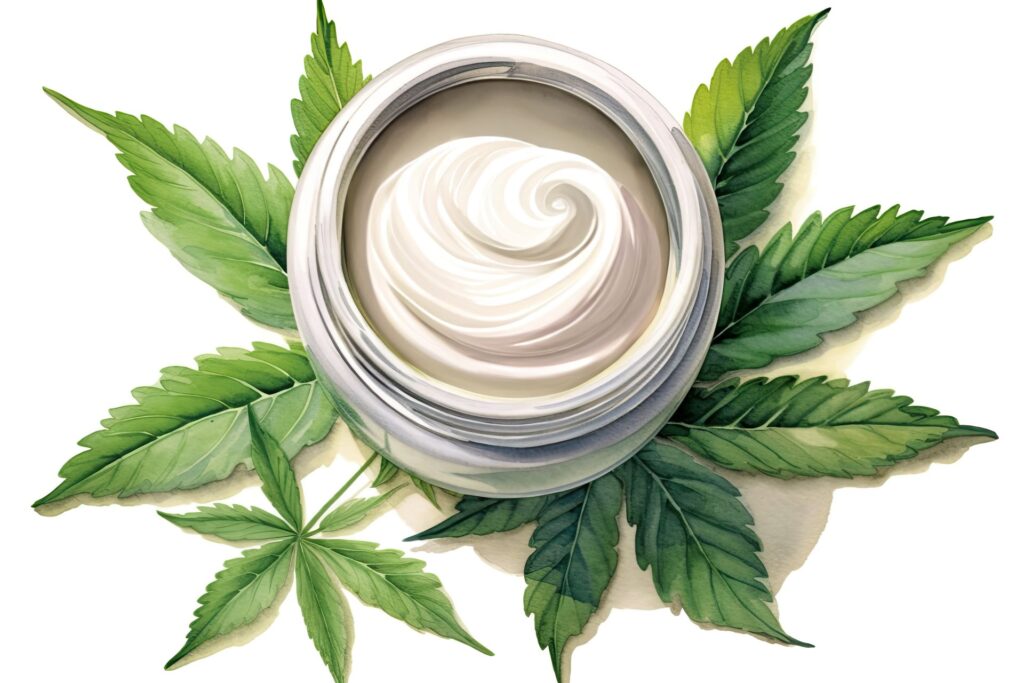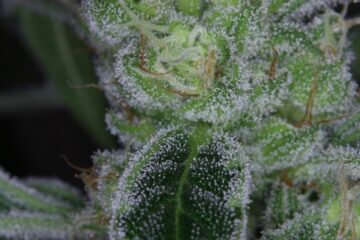Tattoos have held significant cultural and personal meanings, etching stories and symbols onto human skin in a timeless dance of identity and expression. Whether signaling tribal affiliations, rites of passage, or personal aesthetics, they remain deeply entrenched in art and communication.
As tattoos continue to gain mainstream acceptance, there’s a rising curiosity about leveraging natural remedies, like Cannabis, to facilitate the healing process. When ink is injected into the skin, it’s not merely a surface change; it’s a wound. This prompts a series of biological responses where the skin repairs itself, moving through various stages from initial inflammation to eventual maturation.
The right aftercare is vital in ensuring the longevity of the tattoo’s vibrancy and minimizing risks of infections and complications. Here’s a detailed look into how Cannabis helps in tattoo healing.
1. Understanding Cannabis And Its Components
THC and CBD are primary cannabinoids in Cannabis, with distinct roles. THC, or tetrahydrocannabinol, induces the “high” associated with marijuana, while CBD, or cannabidiol, is non-intoxicating and lauded for therapeutic benefits like pain relief and inflammation reduction.
The body’s endocannabinoid system (ECS) regulates functions like sleep and mood and is directly influenced by Cannabis. THC binds to CB1 receptors in the brain, producing psychoactive effects, whereas CBD’s interaction is more indirect and doesn’t induce a “high.”
For therapeutic applications, Cannabis is infused into products like oils for pain and skin health, balms for localized relief, and lotions for broader skin hydration. These offer varied ways to utilize Cannabis’s potential healing properties. For example, Hemponix Tattoo Aftercare Balm contains shea and mango butter to keep the skin hydrated.
2. Benefits Of Using Cannabis For Tattoo Healing

As the cultural intersection of tattoos and Cannabis continues to gain traction, many have begun exploring the therapeutic potentials of Cannabis in the realm of tattoo aftercare. With its varied properties, the plant offers several benefits that can aid fresh tattoos’ recovery and healing process.
- Moisturization: A critical aspect of tattoo healing is ensuring the skin remains well-hydrated. With their nourishing constituents, cannabis-infused lotions and balms hydrates the skin and form a protective barrier, ensuring the tattooed area remains supple and vibrant.
- Anti-Inflammatory Properties: CBD, one of the primary cannabinoids in Cannabis, has been praised for its anti-inflammatory capabilities. For those with fresh tattoos, using cannabis-derived products can significantly reduce the swelling and redness that often accompany the initial stages of the healing process.
- Pain Management: Tattoos, while beautiful, can be painful both during the process and in the immediate aftermath. Cannabis, especially in its topical form, is a viable alternative to traditional over-the-counter pain relievers. Its natural analgesic properties can offer pain relief without many side effects associated with common pain medications.
- Reduction Of Itchiness: As a tattoo heals, it’s not uncommon for the area to become intensely itchy. Cannabis, with its soothing properties, can alleviate this itchiness, making the healing phase more comfortable and reducing the temptation to scratch, which can jeopardize the integrity of the tattoo.
Incorporating Cannabis into tattoo aftercare can be a game-changer, enhancing the healing process while offering relief from some of the most common post-tattoo discomforts.
3. Potential Drawbacks And Concerns
While Cannabis offers a range of benefits, especially in tattoo healing, it’s equally important to be aware of the potential drawbacks and concerns associated with its use. Just as any substance or product has its downsides, cannabis is no exception, and understanding these concerns can lead to more informed and safe choices.
- Over-Reliance On THC: THC is the psychoactive component in Cannabis responsible for the euphoric “high” sensation. Overconsumption or over-reliance on THC, paradoxically, leads to a decreased pain threshold in some individuals, potentially exacerbating post-tattoo discomfort rather than alleviating it.
- Allergic Reactions: Not everyone’s skin will react the same way to a product, which also holds for cannabis-infused items. Some individuals may find themselves sensitive or allergic to certain ingredients in these products, leading to rashes, itchiness, or other unwanted reactions that could compromise tattoo healing.
- Legal Considerations: The global stance on Cannabis is a patchwork of laws and regulations. While it might be legal in one region, it could be strictly prohibited in another. As such, it’s paramount for individuals to be aware of and adhere to local laws and regulations regarding the possession, sale, and use of cannabis products, especially when traveling.
Recognizing these potential drawbacks and concerns is essential, ensuring that the choice to incorporate cannabis into tattoo aftercare is informed and responsible.
Conclusion
In the evolving landscape of tattoo aftercare, Cannabis emerges as a compelling addition, offering notable benefits, including pain relief and reduced inflammation. However, like any therapeutic regimen, it comes with its share of concerns that users must navigate responsibly.
From understanding the difference between THC and CBD to being aware of local legalities, informed decisions are paramount. Embracing cannabis for tattoo healing requires a balance of knowledge, awareness, and attentive care to ensure the best outcomes for skin health and overall well-being.
- SEO Powered Content & PR Distribution. Get Amplified Today.
- PlatoData.Network Vertical Generative Ai. Empower Yourself. Access Here.
- PlatoAiStream. Web3 Intelligence. Knowledge Amplified. Access Here.
- PlatoESG. Automotive / EVs, Carbon, CleanTech, Energy, Environment, Solar, Waste Management. Access Here.
- PlatoHealth. Biotech and Clinical Trials Intelligence. Access Here.
- ChartPrime. Elevate your Trading Game with ChartPrime. Access Here.
- BlockOffsets. Modernizing Environmental Offset Ownership. Access Here.
- Source: https://greencamp.com/cannabis-and-tattoo-healing-3-things-to-know/
- :has
- :is
- :not
- :where
- 1
- a
- About
- acceptance
- accompany
- addition
- adhere
- affiliations
- aftermath
- Aid
- allergic
- alleviate
- also
- alternative
- and
- Another
- any
- applications
- ARE
- AREA
- Art
- AS
- aspect
- associated
- author
- aware
- awareness
- Balance
- barrier
- BE
- beautiful
- become
- been
- begun
- being
- benefits
- BEST
- between
- both
- Brain
- broader
- by
- CAN
- Cannabidiol
- cannabis
- cannabis products
- capabilities
- card
- care
- cbd
- certain
- change
- choice
- choices
- comes
- comfortable
- Common
- Communication
- compelling
- component
- compromise
- Concerns
- considerations
- contains
- content
- continue
- continues
- could
- critical
- critical aspect
- cultural
- curiosity
- dance
- decisions
- decreased
- detailed
- difference
- directly
- distinct
- Doesn’t
- downsides
- drawbacks
- during
- effects
- embracing
- emerges
- enhancing
- ensure
- ensuring
- entrenched
- equally
- especially
- essential
- eventual
- everyone’s
- evolving
- example
- exception
- Exploring
- expression
- facilitate
- Find
- For
- form
- fresh
- from
- functions
- Gain
- game-changer
- Global
- Greencamp
- Have
- healing
- Health
- Held
- helps
- holds
- How
- However
- HTTPS
- human
- hydration
- Identity
- immediate
- important
- in
- Including
- incorporate
- individuals
- Infections
- inflammation
- influenced
- informed
- infused
- ingredients
- initial
- integrity
- interaction
- intersection
- into
- IT
- items
- ITS
- itself
- Jeopardize
- jpg
- just
- Keep
- Know
- knowledge
- landscape
- Laws
- Laws and regulations
- lead
- leading
- Leads
- Legal
- legalities
- leveraging
- like
- LINK
- local
- longevity
- Look
- Mainstream
- Making
- management
- many
- marijuana
- max-width
- May..
- meanings
- merely
- might
- minimizing
- mood
- more
- most
- moving
- must
- Natural
- Navigate
- no
- notable
- of
- offer
- offering
- Offers
- often
- oils
- on
- ONE
- onto
- or
- Other
- outcomes
- over-the-counter
- overall
- Pain
- painful
- Paramount
- passage
- personal
- phase
- plato
- Plato Data Intelligence
- PlatoData
- possession
- potential
- potentially
- potentials
- Praised
- primary
- process
- producing
- Product
- Products
- properties
- Protective
- range
- rashes
- rather
- React
- reactions
- realm
- recovery
- reduce
- Reduced
- reducing
- reduction
- regarding
- region
- regulations
- relief
- remain
- remains
- repairs
- requires
- responses
- responsible
- responsibly
- right
- rising
- risks
- roles
- ROW
- safe
- sale
- same
- scratch
- sensitive
- Series
- several
- Share
- side
- significant
- significantly
- Skin
- sleep
- some
- stages
- Stories
- substance
- such
- Surface
- system
- tetrahydrocannabinol
- than
- that
- THC
- The
- The Area
- their
- themselves
- Therapeutic
- These
- they
- things
- this
- those
- threshold
- Through
- timeless
- to
- traction
- traditional
- Traveling
- Tribal
- Uncommon
- understanding
- unwanted
- use
- users
- using
- utilize
- various
- viable
- vibrant
- vital
- Way..
- ways
- when
- whereas
- whether
- which
- while
- will
- with
- without
- zephyrnet












